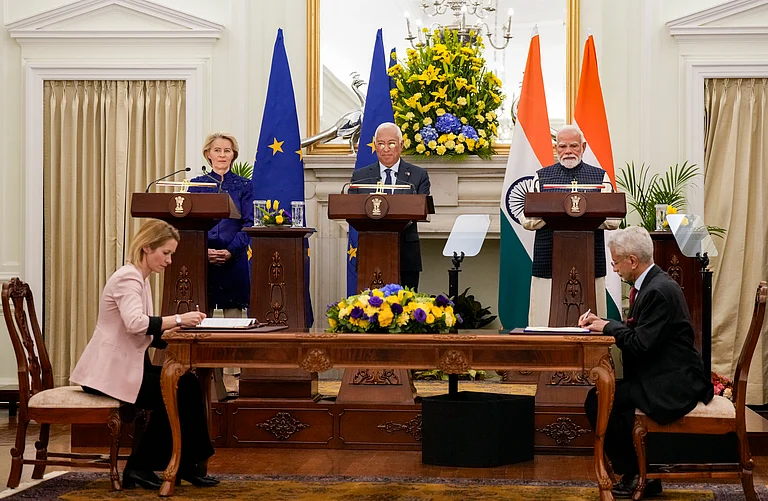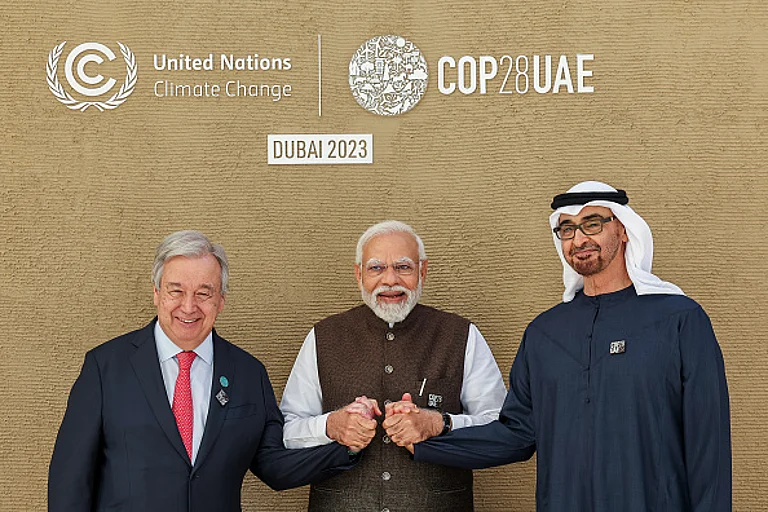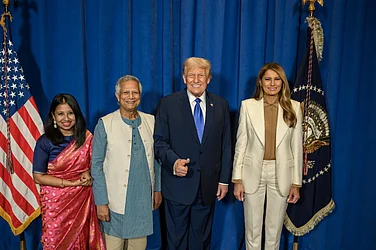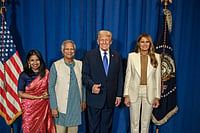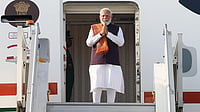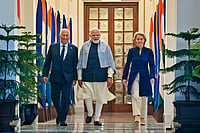India and the UK announced a landmark Technology Security Initiative (TSI), further consolidating and taking forward relations with the new Labour government in London, during foreign secretary David Lammy’s first visit to India. He held extensive talks with foreign minister Subrahmanyam Jaishankar and met with Prime Minister Narendra Modi and NSA Ajit Doval.
The TSI will lead to crucial collaboration on telecom security that could help protect sensitive communication data with the potential of opening up investment opportunities across emerging technologies.
The new Labour government of Prime Minister Keir Starmer has had to hit the ground running as it tries to revive the British economy and push growth ravaged by 14 years of Conservative mismanagement of the economy. Britain is paying the price of leaving Brexit and was hit hard like the rest of the world by the Covid lockdown.
"We are both countries which have a big global presence in different ways. So I think it's also important that India and the UK work together on global issues and in global platforms," Jaishankar said, as he sat down for formal talks with his counterpart on Wednesday evening.
"I do believe that our relationship, it is a very important relationship with enormous possibilities...And how we explore those possibilities, how do we realize our potential in a more meaningful way, is one of the tasks that I look forward to undertaking with you," the minister added.
By all accounts the talks were extremely positive. After the meeting, the MEA said in a statement that the TSI "will reinforce existing collaborative efforts in various technologies, broaden the mandates of existing mechanisms, and establish new mechanisms for cooperation.’’ The progress of the TSI will be reviewed every six months at the level of deputy NSA on the Indian side and his British equivalent. A bilateral mechanism for the promotion of trade in critical and emerging technologies, including resolution of relevant licensing or regulatory issues will be set up to track developments.
"This government will put growth at the heart of our foreign policy. That’s why three weeks into the job, I am in Delhi announcing a new Technology Security Initiative to deliver on the promise of the UK-India relationship…This will mean real action together on the challenges of the future from AI to critical minerals. Together we can unlock mutual growth, boost innovation, jobs and investment,’’ Foreign Secretary Lammy said.
A new £7-million funding call for Future Telecoms research was also announced by UK Research and Innovation (UKRI) and India’s Department of Science and Technology, under the India-UK science, technology, and innovation partnership.
The India-UK free trade agreement, which was negotiated with the last government figured prominently in the talks as both sides are eager to get the deal sealed. Trade negotiations usually take a long time. This deal has been on the table for the last two years. Much of the ground has already been covered with the previous Conservative government. However, some sticking points remain. An FTA will help both countries.
Ahead of his visit, Lammy said, “Our free trade agreement negotiations are the floor not the ceiling of our ambitions to unlock our shared potential and deliver growth, from Bengaluru to Birmingham. We have shared interests on the green transition, new technologies, economic security and global security.’’ He also said, “I am travelling to India in my first month as Foreign Secretary because resetting our relationship with the global south is a key part of how this government will reconnect Britain for our security and prosperity at home.”
India and Britain’s political relations are excellent; there have been no major hiccups in recent times. In the past there had been quibbles over human rights violations in Kashmir, but since the end of the Cold War and New Delhi’s warming ties with the US and its Western allies, Kashmir has not been a major issue. Like the US and other Western powers, the UK regards China’s growing assertiveness in the Indo-Pacific as a threat to world peace. While India is part of the quad, a US-India-Australia-Japan grouping in the Indo-Pacific, the Aukus is a defence treaty between Australia, the UK and the US to guard the Pacific waters from China’s expanding naval presence and ensure free movement of goods in the waters of the Pacific.
With the world now increasingly aware of the threat posed by global warming, Jaishankar and Lammy also discussed collaboration on fighting climate change, with the emphasis on green transition.
While the UK is on the forefront in the fight against climate change, a report released by the International Institute for Sustainable Development (IISD) published in several British newspapers noted that five of the world's rich countries, including the US, Britain, Norway, Canada and Australia have issued new licenses for oil and gas exploration. The IISD noted that these will generate high level of emissions. This is why the global south points a finger at the developed world for its double standards.
David Lammy left India this morning and is travelling to Laos for the ASEAN foreign minister’s meeting, which will also be attended by Jaishankar.










